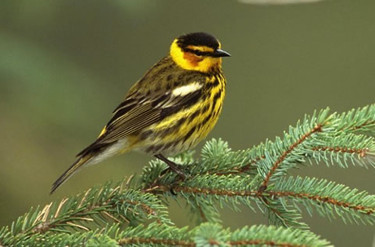Cape May Warbler on Conifer Branch
How blessed am I—ordained forty years ago this weekend. Anyone who's done anything for forty years can say, "There's a lot of water under the bridge." In 1979 I ran full flood into my new priesthood, at once crashing into disappointment that lasted years. I don't think priesthood is any more difficult than any other way of life serious people choose to live: growing through the stresses of relationships, raising children, slugging it out in a demanding job, keeping faith alive. Then, there is the inner work of trying to evolve into the real and full person God hoped I'd become. That may be the hardest part of all.
So, what about this priest and the Cape May Warbler? God went to a lot of trouble to create our planet-home, and I believe he put the animals into our lives that they might in some way be lovely companions. Someone might say that sounds flaky, but I don't think so. In the Genesis story, God gave us (not the angels) the honor of naming the animals. I wish we felt that more deeply.
When we encounter the animals then, we might pay particular attention, as they may have a message for us, especially as we research how they survive and thrive. Earlier this week I stumbled on an online photograph of a Cape May Warbler. Thrilled by its beauty, I did some investigating.
The Cape May is one of fifty species of warblers living in the United States and Canada. We don't see them at our feeders because they're forest dwellers. But very adaptable at that! The Cape May generally lives in conifer (evergreen) forests, but can also adapt and live among deciduous trees and even thickets at the edge of the forest. In its winter range it's found feeding in the tops of Florida or Caribbean palm trees.
Cape May Warblers migrate by night because the air is calmer, cooler and there are fewer predators to avoid. This wonder-bird can hang upside down to get at insects hidden underneath leaves. It even has a tubular tongue which can suck the nectar out of flowers and juice out of ripe fruit.
So the Cape May Warbler is a skilled survivor. A friend wrote recently, "Of the thousands of people you have known as a priest over these many years, which ones stand out in your memory?" That's an easy and pleasing question to answer: the strugglers and survivors stand out. Arnold, who was deaf, unable to speak, and who spent the day kneeling under the crucifix in church. The folks in AA who follow the sobering-discipline of honesty, generosity and surrender. The parents of special needs kids. The husband who on Christmas night kept vigil over his dying wife in hospice. The college kids who prayed with me standing around their dear friend who had just died of AIDS complications. The hospital crew who cleaned and sterilized the ER when the awful emergency was over. The young soldier banging on the door in the middle of the night, shaking and weeping, hours before he had to show up to begin his third tour in Iraq.
My own priesthood story is a story not only of survival through the disappointment, but thriving. A counselor who knew me well said, "Stephen, the house is on fire, and you're trying to get a few things out to safety." That's especially true this time in my life, which now intersects with you—folks all around the world. I send my prayer, and a blessing for you and your families. May you stay standing in the dark chaos, but also thrive in God's Christ-love for you and all of wounded humankind.
